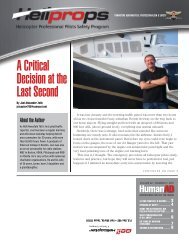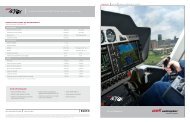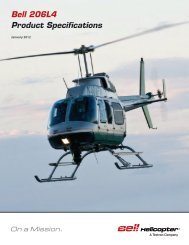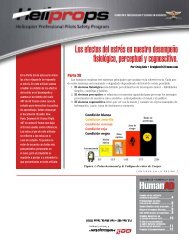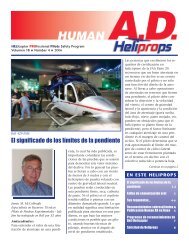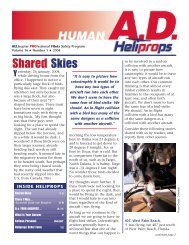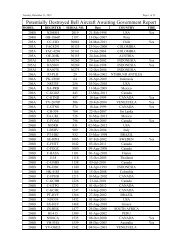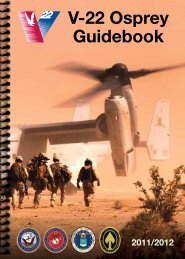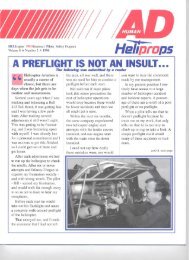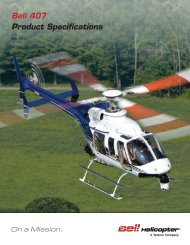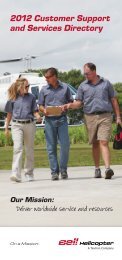Single Pilot Looking for CRM - Bell Helicopter
Single Pilot Looking for CRM - Bell Helicopter
Single Pilot Looking for CRM - Bell Helicopter
You also want an ePaper? Increase the reach of your titles
YUMPU automatically turns print PDFs into web optimized ePapers that Google loves.
<strong>Single</strong> <strong>Pilot</strong> continued<br />
People outside the flight station can<br />
profoundly affect the success or failure of<br />
the mission be<strong>for</strong>e, during, and after the<br />
day is done.<br />
you aren’t the first person to whom it has<br />
happened. You can contact the local FAA<br />
office, an AOPA group, the instructors or<br />
customer service from the manufacturer<br />
of your helicopter <strong>for</strong> assistance. Any of<br />
these groups would be happy to a help<br />
you learn from an incident. As much as<br />
these folks will help you, you have a much<br />
closer resource in the pilots from your<br />
own company or the pilots in your local<br />
flying area. Be willing to talk to others<br />
in the industry and you can increase your<br />
knowledge base immensely.<br />
The essential skill we all learn in <strong>CRM</strong><br />
is situational awareness. Believe it or not<br />
all of the items and attitudes discussed to<br />
this point will aid your level of situational<br />
awareness. They may not speak to a<br />
particular mission, but they will add<br />
to your situational awareness on all<br />
missions. If everyone in aviation always<br />
acted with integrity, you would be more<br />
aware about the status of your aircraft,<br />
yourself, your mission and outside<br />
influences. Sharing your experiences<br />
with others and learning from theirs will<br />
help keep your awareness high. Reading<br />
about past mishaps and the causal factors<br />
involved will help you avoid becoming<br />
another statistic and will continually<br />
raise your situational awareness. These<br />
are all things you can do be<strong>for</strong>e you ever<br />
take off.<br />
There are several other skills we have all<br />
heard about in <strong>CRM</strong>, but their effective<br />
use depends entirely on your accurate<br />
situational awareness. Your decisions and<br />
analysis of the mission are based on what<br />
you think is true. Your communication is<br />
4 VOLUME 19 #2 • HELIPROPS<br />
fixed in a paradigm based on what you<br />
think is accurate. Your willingness to<br />
lead, be adaptable or assertive are directly<br />
effected by how you are interpreting your<br />
reality on that day. The point here is you<br />
need to ensure you have done everything<br />
you can be<strong>for</strong>e and during the flight to<br />
make certain your situational awareness<br />
is as good as it can be.<br />
We have talked about things to do be<strong>for</strong>e<br />
the flight to better prepare you and your<br />
attitudes be<strong>for</strong>e you take flight, but what<br />
are some of the simple things pilots often<br />
<strong>for</strong>ego in flight which can help develop<br />
better situational awareness and <strong>CRM</strong>?<br />
Flight following is something pilots<br />
frequently do without. You just want to<br />
get in your aircraft and fly from point A<br />
to point B and speak to no one. Air traffic<br />
controllers can help you with traffic<br />
in<strong>for</strong>mation, coordination, weather,<br />
and tracking your location if you have<br />
a problem. They can be a vital member<br />
of your “crew.” How often do you ignore<br />
that resource? It will certainly make <strong>for</strong><br />
faster communication in an emergency<br />
if you are already tuned in and talking<br />
to them. What about tuning up a CTAF,<br />
even if you aren’t technically going into<br />
their pattern? At a minimum, you can<br />
learn about traffic coming into and out of<br />
the area. Often times you can learn more<br />
than that. Next time you fly, consider<br />
what other resources (crew members) you<br />
have at your disposal. Now ask yourself<br />
why you aren’t taking advantage of them.<br />
LOOKING AHEAD<br />
Are there any good reasons?<br />
<strong>CRM</strong> isn’t a mechanism to eliminate<br />
errors or accidents. It is a skill set to<br />
help aviation professionals avoid errors,<br />
recognize in evaluation they have made<br />
an error or to reduce consequences if an<br />
error is noticed too late to avoid. Human<br />
errors will never be totally eradicated,<br />
but we can help each other learn from<br />
experience. We can also learn to be open<br />
to reality and not the reality we create<br />
in our own mind. We can increase our<br />
awareness by taking advantage of all<br />
available resources. We can also realize<br />
we are just as likely to make mistakes<br />
as anyone else. Learn from others errors<br />
and help us learn from yours. Remember,<br />
it really can happen to you on any given<br />
day.<br />
Here is a parting thought to consider<br />
when you are inclined to judge someone<br />
else too harshly after learning about<br />
an accident; this is contributed to an<br />
anonymous FAA inspector of long ago:<br />
“For every mishap there were decisions<br />
made by the pilot. He called upon the<br />
sum of all his knowledge and made a<br />
judgment. He believed in it so strongly<br />
that he knowingly bet his life on it. That<br />
his judgment was faulty was a tragedy,<br />
not stupidity. Every person who came in<br />
contact with him had an opportunity to<br />
influence his decisions, so a little of all of<br />
us goes with every pilot we lose.”<br />
Keep each other safe.<br />
Future issues of Heliprops will feature these upcoming articles:<br />
LEAVE THE HELICOPTER RUNNING, NO PILOT?<br />
Operations under Part 135<br />
SPILT CONES – READER FEEDBACK<br />
What to look <strong>for</strong>.<br />
THE SAFETY CULTURE – MANAGEMENT BUY-IN<br />
Does your management/owner pressure pilots to fly outside their<br />
skill level or fly beyond the equipment’s capabilities?



